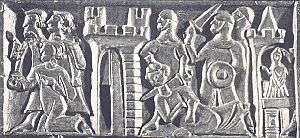Matins of Bruges
The Matins of Bruges (Flemish: Brugse Metten) was the nocturnal massacre of the French garrison in Bruges on 18 May 1302 by the members of the local Flemish militia. It has been named "Matins" (after a monastic liturgy) in analogy to the Sicilian Vespers of 1282.[1] The revolt led to the Battle of the Golden Spurs, which saw the Flemish militia defeat French troops on 11 July 1302.

Background
Bruges had had the exclusive rights for the importation of sheep's wool from England. This trade was in the hands of the bourgeois but when Edward I began to deal directly with the customers, the traders lost their advantage. The traders and their political agents, the "aldermen", called upon their liege, Philip the Fair, to maintain their dominant monopolistic position. To do so, he garrisoned French troops in the town, a highly unpopular action that caused widespread fear and anger among the Flemish in Bruges.[2]
History
During the night of 18 May 1302, armed insurrectionists led by Pieter de Coninck and Jan Breydel entered the houses where the French were garrisoned. According to tradition, to distinguish the French from the natives, they asked suspects to repeat the shibboleth: "schild en vriend" which means "shield and friend" a phrase difficult to pronounce for a French speaker. Another version suggests the alternative "des gilden vriend", "friend of the guilds". Only the governor, Jacques de Châtillon, who absconded after he failed to rally the garrison, and a handful of the French managed to escape with their lives. Approximately 2,000 people are estimated to have died.[3]
After the Bruges Matins, Jan Breydel and Pieter de Coninck were celebrated as the leaders of the insurrection. Their statue, which was an initiative of Julius Sabbe, has decorated the market in Bruges since 1887.
See also
References
Notes
- Pirenne 1915, p. 146-147.
- Omond 1908, p. 40.
- Omond 1908, p. 46.
Bibliography
- Omond, George William Thomson (1908). Belgium. A. & C. Black.CS1 maint: ref=harv (link)
- Pirenne, Henri (1915). Belgian Democracy, Its Early History. Translated by Saunders, J.V. Manchester University Press.CS1 maint: ref=harv (link)
External links
